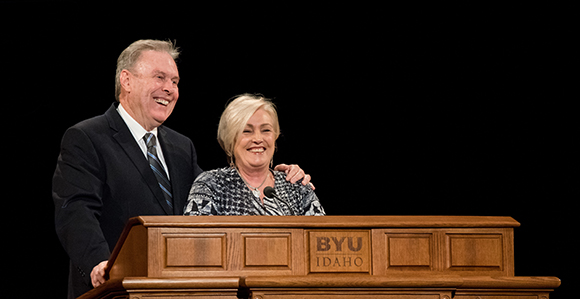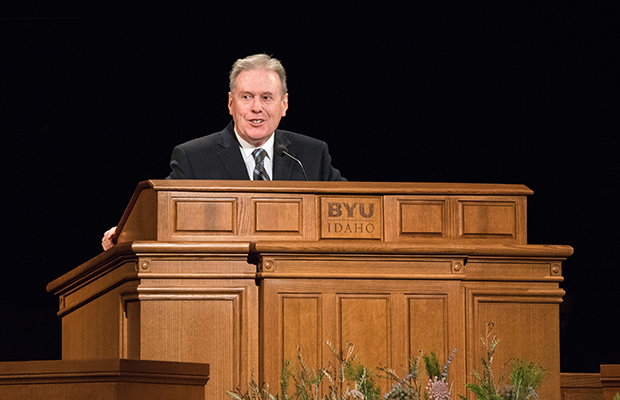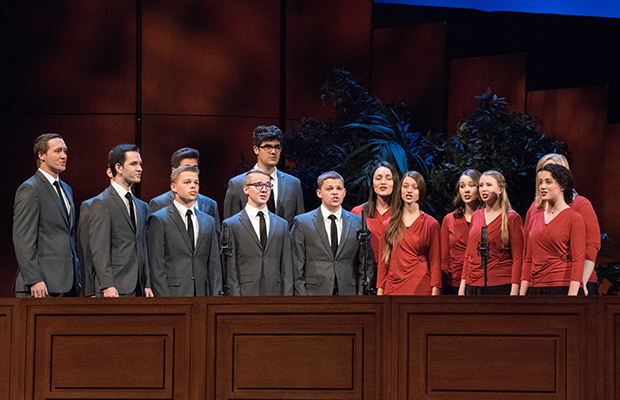Seventy Explains How Working at McDonald’s Led Him to the Gospel
Contributed By Marianne Holman Prescott, Church News staff writer

Elder Terence M. Vinson and Sister Vinson speak at BYU–Idaho’s weekly devotional.
Article Highlights
- Both spiritual and intellectual knowledge are necessary for a successful life.
- Spiritual knowledge is as certain and true as intellectual knowledge.
“We can be just as sure of [spiritual] knowledge as scholars and scientists are of the different kinds of knowledge they have acquired by scientific means.” —Elder Terence M. Vinson of the Seventy
Related Links
As young students at a university, Terence M. Vinson and Kay Carden met while working at a local McDonald's.
“We met and started to talk about our lives and about religion,” Sister Kay Vinson recalled during a BYU–Idaho devotional on September 25. “And I said I was a [member of the Church].”
The two would often discuss their views with each other.
“I had never before heard of this Church of which she was a member,” said Elder Vinson, who is a General Authority Seventy and serves in the Presidency of the Seventy. “Having grown up as a Catholic, and having embraced that religion, I felt that in order to accept the teachings of The Church of Jesus Christ of Latter-day Saints I needed to be totally convinced intellectually that my previous … beliefs were mistaken and that these new teachings were truly teachings of the restored gospel that Jesus Christ had previously established.”
Eventually he decided “they” needed to figure out what church was the right church to attend.
“He came up with a plan,” Sister Vinson said. “We would attend mass and we would attend sacrament meeting, and after a while we would determine which church is true.”
During this time, several sets of missionaries taught him, and he always had questions for them.
“When they could not answer my questions, they would go away and then return the following week with the answers, but then I had more questions,” he said. “This continued for several weeks as I tried to receive an intellectual conversion.”
As he was sitting in a Church meeting one day, Elder Vinson said he felt a clear message from the Holy Ghost: “Terry, all of your questions have answers. It is not important for you to know them all now. As the questions come to you, they will be answered. But I need you to act and to be baptized now.”
His study and pondering led to revelation from the Holy Ghost.
“I immediately acted and was baptized,” he said. “Over the subsequent 44 years, the prophecy contained in that revelation has been fulfilled. All of my questions have been answered, including those I had not even considered 44 years ago.”
Sister Vinson said of her husband, “When we were married he realized he was way behind all the other men in the Church because they had grown up in the Church and been on missions, and he was just starting out. So he began to study the gospel very, very seriously and would rise in the morning very early at 4:30 a.m., and he would start to study the scriptures.”
Recognizing knowledge is an important part of life, the leader taught that nonetheless it is only part of a successful life.
“You can have great knowledge but fail at life,” Elder Vinson said. “You can have a great career but fail at life. Conversely, you can have little academic knowledge or a forgettable career but still have a very successful life—because life is about relationships with God and with others.”

Elder Terence M. Vinson of the Presidency of the Seventy speaks on spiritual knowledge at the weekly devotional at BYU–Idaho on September 25. Photo courtesy of Cami Su, BYU–Idaho.
The leader asked, “So then, if this is the determinant of success in life, do we really need to learn knowledge?
“Well, very clearly: Yes!
“The Lord’s admonition to us with respect to learning is very clear,” he said. “He tells us, ‘And as all have not faith, seek ye diligently and teach one another words of wisdom; yea, seek ye out of the best books words of wisdom; seek learning, even by study and also by faith” (Doctrine and Covenants 88:118).
Both knowledge and wisdom are necessary, the leader taught.
Drawing from the African proverb from Guinea, Elder Vinson said, “Knowledge without wisdom is like water in the sand.”
“We are easily indoctrinated in modern society to believe that we can only really know something through our intellects and our physical senses,” he said. “There is no tolerance in the modern world for things that can’t be proven scientifically.”
There are two ways of knowing things—scientifically through the use of reasoning and physical senses, and spiritually through revelation and the spiritual senses.
“In modern revelation God promises us that we will receive ‘knowledge’ by His telling us in our mind and in our heart ‘by the Holy Ghost,’” he said. “This is revelation.”
One of the greatest things about the plan of Heavenly Father for His children is that each person can know the truth individually. Revealed knowledge doesn’t come from books, scientific proof, or intellectual pondering, he said. Rather, it comes directly from Heavenly Father through the witness of the Holy Ghost.
“When we know spiritual truths by spiritual means, we can be just as sure of that knowledge as scholars and scientists are of the different kinds of knowledge they have acquired by scientific means,” he said.
Although spiritual and intellectual knowledge are different, both are important.
“To comprehend the things of the world, one must be intellectually enlightened; to know and understand the things of God, one must be spiritually enlightened.”
And revelation is essential to knowing the things of God.
“The things of God cannot be learned solely by study and reason,” he said. “Please also note that study and reason precede revelation, and the intellect will confirm the revelation. But it's not the intellectual confirmation that’s most important; it’s the revealed truth and our acting on it. We learn through study and faith.”
Despite the “apparent conflict between reason and revelation,” the rational and the religious views of the world are not the opposites of one another, he taught.
“The view of religion, at least the religion that is undiluted by apostasy, includes reason as well as revelation and embraces the truths determined by both,” he said. “In contrast, the rational view excludes what is spiritually revealed.”
Revelation comes by study and by faith.
“Hence, very clearly, we have a responsibility to know by both ‘reason’ and by ‘revelation,’ with the second of those skills, revelation, being an essential component for spiritual knowledge and wisdom,” he said.

Vocal Union, a singing group at BYU–Idaho, performs during the campus devotional on September 25. Photo courtesy of Cami Su, BYU–Idaho.
